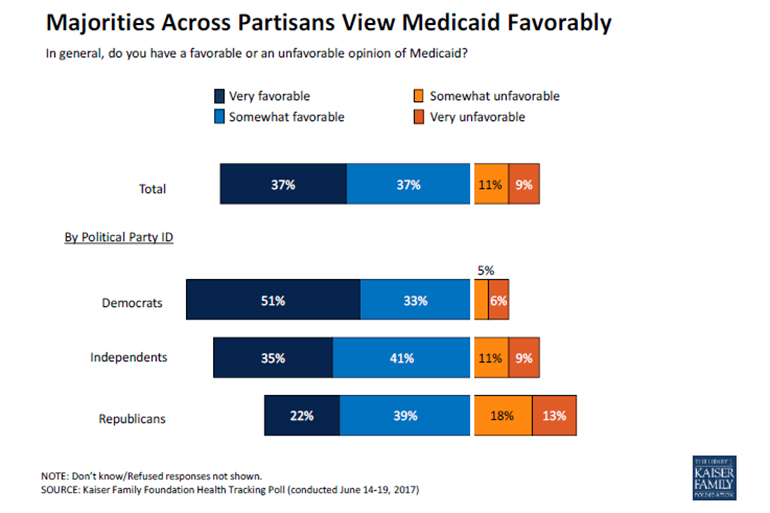Congress is moving fast toward repealing the Affordable Care Act, with an eye on revamping Medicaid, the health insurance program for low-income people. But most Americans say the program — which Republicans call a “broken system” — is working well on the national level and within their states.
That’s according to a monthly tracking poll released Friday by the Kaiser Family Foundation. (Kaiser Health News is an editorially independent project of the foundation.) That support, the poll suggests, holds true across the political spectrum, though support was strongest among Democrats.
While almost three-fourths of Americans have a favorable view of Medicaid, only about four in 10 — 38 percent — are aware that the House-passed American Health Care Act would make major funding reductions and structural changes to the program. About a fourth of respondents said the bill made “minor reductions” to Medicaid, and 13 percent didn’t realize there were any proposed cuts. (The poll was conducted before the Senate released its legislation on June 22.)
The nonpartisan Congressional Budget Office estimates the House bill would cut the program by $834 billion over a decade. The Senate measure has not yet been scored — that analysis is expected next week — but its cuts to Medicaid are steeper. Congressional Republicans argue their plans gives states more flexibility, so they can run efficient programs that make up the difference. Critics worry the size of the funding cuts would mean states ultimately scale back benefits and limit who’s eligible for the program. Traditionally, states and the federal government have jointly funded the program, and its budget isn’t capped.
The proposed Medicaid changes were not initially a major point of discussion surrounding consideration of the House bill, the KFF poll notes, which may partly explain why many respondents were unaware of its effect.
Since then, the program has become a sticking point in the Senate. Many moderate Republicans — particularly those whose states expanded the program under the ACA — have expressed concern about scaling back eligibility or funding. The cuts have also spurred criticism from industry groups — particularly hospitals and medical associations — along with organizations treating mental illness and drug addiction, which often rely on Medicaid dollars.
Respondents did express support for some program changes. Seventy percent thought states should be allowed to have work requirements for people on Medicaid — meaning able-bodied beneficiaries must have or be seeking a job to qualify for the program and 64 percent supported letting states drug test people before letting them get Medicaid. This support held up across party lines.
Other proposed changes were less popular. For example:
- About 36 percent of respondents favored letting states limit how long people can qualify for Medicaid, the same as supported cutting federal funds for the program’s expansion.
- Thirty-five percent back limiting the amount of federal funding states can receive.
- Thirty percent support stopping Medicaid payments to Planned Parenthood for a year — another change included in the Senate bill and seen by many as a way to win conservative backing.
- Twenty-one percent favored limits on Medicaid coverage for long-term care for seniors and people with disabilities.
Republicans were more likely to support all of those policies.
When it comes to possible changes to the health insurance system, respondents generally favored more federal regulations on insurance plans. Across party lines, a majority said the government should ban insurance companies from charging more to cover people with preexisting health conditions. They also said the all plans should be required to meet a certain standard of coverage, known as “essential health benefits.” The House bill would let states apply through waivers to let insurance carriers offer skimpier plans.
The poll also marked the first time a majority of respondents — 51 percent — indicated they viewed the ACA favorably. KFF has tracked the law’s popularity since it passed in 2010.
At the same time, public support for House Republicans’ health bill declined. About 55 percent of respondents viewed the bill in a negative light — the same as a month before — but disapproval had grown among Republicans. Previously, 67 percent of Republican respondents supported the measure. This time, only 56 percent did. Among respondents who supported President Donald Trump, 55 percent approved of the Republican bill, compared with 69 percent in May.
Regardless of party, a minority thought repealing the law should be the White House’s top concern. But the political implications are still unclear — respondents were split in answering whether they would support lawmakers who voted for repeal. About half of Democrats would be more likely to vote against such a lawmaker, while just over 60 percent of Republicans would be more likely to support one. About 35 percent of independents would view a vote for repeal negatively, and 30 percent would view one favorably.
This month’s poll was conducted by telephone, between June 14 and 19, using a nationally representative random sample of about 1,200 adults. The margin of error is +/- 3 percentage points for the full sample.







